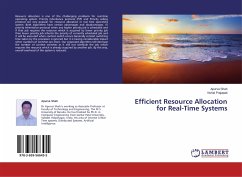Resource allocation is one of the challenging problems for real-time operating system. Priority inheritance protocol (PIP) and Priority ceiling protocol are very popular for resource allocation in real time operating system. Both algorithms have certain advantages and disadvantages. In priority inheritance protocol when any higher priority job is scheduled and if that job requires the resource which is acquired by lower priority job than lower priority job inherits the priority of currently scheduled job and it will be executed when context switch occurs.Generally context switching time taken by the processor is ignored but it is having considerable impact when numbers of switches are more. Our proposed algorithm will decrease the number of context switches as it will not schedule the job which requires the resource which is already acquired by another job. By this way, overall overhead of the system is reduced.
Bitte wählen Sie Ihr Anliegen aus.
Rechnungen
Retourenschein anfordern
Bestellstatus
Storno








